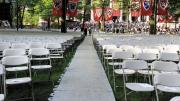Commencement and reunions week—the highlight of Harvard’s social calendar—draw crowds of alumni and guests each year
To best accommodate older alumni—and anyone else—who may be in need of accessibility services in order to enjoy their visit, the Harvard Alumni Association (HAA) and the Commencement Office offer options ranging from special parking permits, shuttle vans, and rentable wheel chairs to CART (Communication Access Real-Time Translation) technology and Commencement programs translated into Braille. In 2013, for example, additional ramps and other accessible paths were installed in the Yard to make it easier for individuals, including those in wheelchairs or with other mobility concerns, to get around.
“The reunion-class program committees and the HAA work very hard to make it possible for all those who want to attend their reunions to do so,” says the HAA’s Courtney Shurtleff, director of College Alumni Programs. “We work with alumni and their guests on a case-by-case basis.” She advises anyone who needs or wants to learn about accessibility services to contact the HAA as soon as possible, at 617-496-7001. They may also visit the Commencement Office’s website, https://commencement.harvard.edu/guests-disabilities, or that of the University Disability Services office, https://accessibility.harvard.edu/commencement-2014.
Accessible parking, transportation, sign language interpreters, captioning on the LED screens, and seating will be available, as will accessible restrooms. The morning’s Commencement Exercises may be viewed, as usual, in open-caption format on large-screen televisions in the Science Center and at most of the Houses. Other, specific accommodations may also be available, if requested well in advance of May 29, Commencement Day. Forms for requesting an assistive listening device can be found at https://accessibility.harvard.edu/services-individuals-who-are-deaf-or-hard-hearing. “I am unsure if more people are requesting assistance,” Shurtleff says, “but people are living longer. This year I am working with officers of the Class of 1944, who are celebrating their seventieth reunion.”








